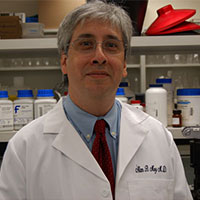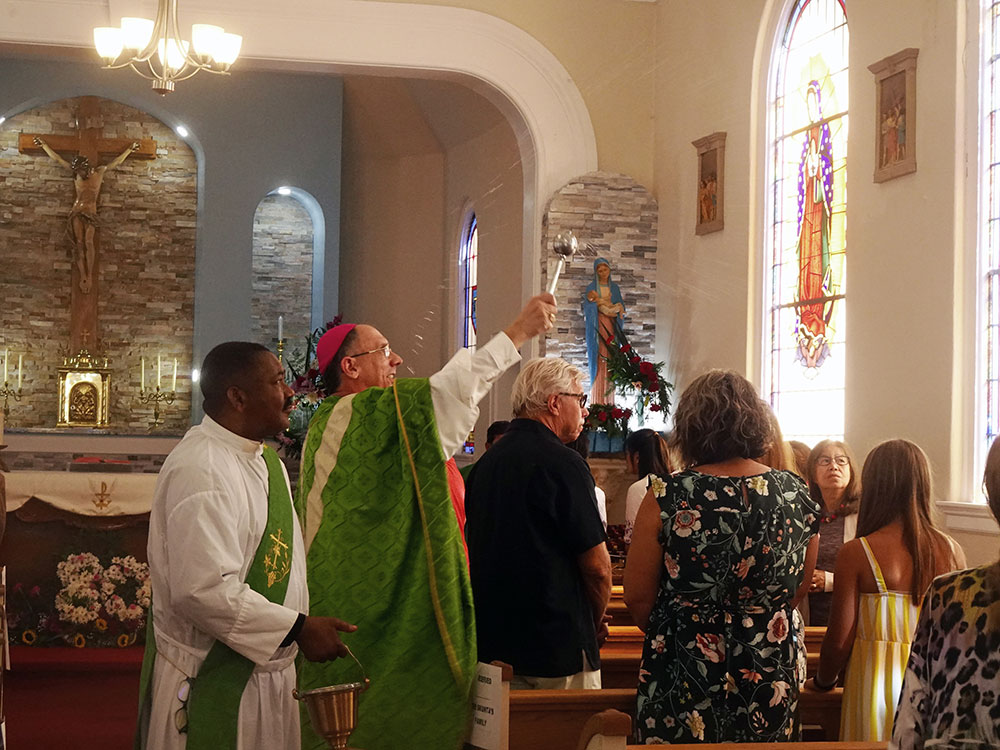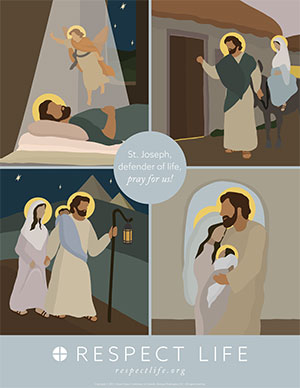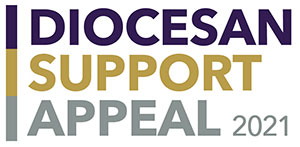October is Respect Life Month
Every October, we consider more deeply why every human life is valuable and reflect on how to build a culture that protects life from conception to natural death. The month is a time to celebrate Respect Life Month, and the first Sunday of October is designated as Respect Life Sunday.
This year’s celebrations focus on St. Joseph, defender of life.In a reflection from the U.S. bishops’ Secretariat of Pro-Life Activities, St. Joseph is noted as a perfect model for the Church’s pro-life work:“The infant Christ ‘came into our world in a state of great vulnerability. He needed to be defended, protected, cared for and raised by Joseph’ (“Patris corde,” 5). The humble and often hidden carpenter of Nazareth accompanied Mary in her pregnancy, assisted at the birth of the Messiah in a stable, presented Jesus in the Temple, fled with his family far from their homeland to protect them, and lovingly raised Jesus as his own son in the years to come.“While the angel of the Lord appeared to Mary to announce that she would bring forth the Savior of the world, it was revealed to Joseph in a series of dreams how God’s plans would be brought to fulfillment. As Pope Francis highlights, ‘God trusted Joseph, as did Mary, who found in him someone who would not only save her life, but would always provide for her and her child’ (“Patris corde,” 5).
“Like every other human family, the Holy Family had to confront real and concrete challenges. Yet, ‘in every situation, Joseph declared his own “fiat”’ (“Patris corde,” 3). His ‘yes’ to the Lord meant that regardless of the hardship and personal sacrifice to himself, he consistently chose to put the needs of Mary and Jesus before his own. Joseph’s devotion helps reveal to us our own call to show special care for the lives of those whom God has entrusted to us.
“During this Year of St. Joseph, each of us can find in him ‘an intercessor, a support and a guide in times of trouble’ (“Patris corde,” Intro). Joseph shows us how to say “yes” to life, despite our own fears, frailties and weaknesses. For it is Joseph who was ‘chosen by God to guide the beginnings of the history of redemption. He was the true ‘miracle’ by which God saves the child and His mother’ (“Patris corde,” 5).
“May we, too, be miracles in the lives of those who are most in need, especially at the beginning and end of life.
“Dear St. Joseph, you who were ‘able to turn a problem into a possibility by trusting always in divine providence’ (“Patris corde,” 5), help us to imitate your faithful trust and courage.”
Resources available online
At www.respectlife.org: Find prayers, ideas for getting involved, reflections and videos, and more information about the Church’s pro-life teachings and the celebration of Respect Life Month
 Your DSA contributions at work
Your DSA contributions at work
The diocese’s Respect Life ministry is funded in part by the annual Diocesan Support Appeal. Learn more about the DSA and how to donate online at www.charlottediocese.org/dsa.
Diocesan Respect Life Conference to feature expert in pro-life biotech
 SWANNANOA — Faithful across the Diocese of Charlotte are encouraged to attend the annual Respect Life Conference – a day of enrichment and education on a variety of pro-life issues. The conference will dive into topics such as pro-life ethical research and advancing biotechnology without morally illicit cells, parish support for mothers choosing life, “Evangelium Vitae” and the Christian message concerning life.
SWANNANOA — Faithful across the Diocese of Charlotte are encouraged to attend the annual Respect Life Conference – a day of enrichment and education on a variety of pro-life issues. The conference will dive into topics such as pro-life ethical research and advancing biotechnology without morally illicit cells, parish support for mothers choosing life, “Evangelium Vitae” and the Christian message concerning life.
The conference will take place from 9 a.m. to 3:30 p.m. Saturday, Oct. 2, at St. Margaret Mary Church.
Dr. Alan Moy, founder of the John Paul II Medical Research Institute and CEO and co-founder of Cellular Engineering Technologies, will give the keynote address.
Moy earned a bachelor of science in biochemistry at the University of California at Davis and an M.D. from Creighton University. He received specialty medical training in internal medicine at St. Louis University and subspecialty training in pulmonary and critical care at the University of Iowa. He served on the faculty 1994-2005 and was tenured in the Department of Medicine and the Department of Biomedical Engineering at the University of Iowa. He maintains an adjunct appointment in the College of Engineering at the University of Iowa.
Moy’s research at the University of Iowa was in the areas of vascular biology, inflammation, gene delivery and tissue engineering. His research was supported by the National Institute of Health, the American Heart Association, the American Diabetes Association and the American Lung Association.
In 2005 he left his faculty position to co-found Cellular Engineering Technologies (CET), a pro-life biotech company in Coralville, Iowa, which manufactures and sells commercial adult stem cells around the globe. In 2006, he founded the John Paul II Stem Cell Research Institute (later renamed the John Paul II Medical Research Institute), a tax-exempt non-profit research institute devoted to the use of adult stem cells for treating orphan diseases, degenerative neurological diseases, regenerative medicine and cancer. In 2009 the Small Business Commerce Association gave CET a Best Business Award in the commercial biotechnology category. The award recognizes the top 5 percent of small businesses throughout the country.
Moy has been recognized in Who’s Who in America and in the Leading Physicians of the World by the International Association of Healthcare Professionals. His organizations develop biotechnologies with the objective to offer ethical human cells as an alternative to embryonic stem cells and aborted fetal cells, which are ubiquitously used in the pharmaceutical industry for the production of biologics, gene therapy, cell therapy and vaccines.
The conference will also feature prayer and education to foster encouragement, collaboration and community among the pro-life advocates of the diocese. The conference will open with a Traditional Latin Mass offered by pastor Father Brian Becker at 9 a.m. and conclude by 3:30 p.m.
“The Respect Life Program is thrilled to be hosting this event again this year,” said Jessica Grabowski, the diocese’s Respect Life Program director, “and we are especially grateful to Father Becker and St. Margaret Mary (for hosting) the pro-life community and look forward to networking with pro-life advocates from across the diocese.”
Additionally, Moy will present a talk to the lay-led organization Catholic Health Professionals of Charlotte at a Charlotte-area parish on Friday, Oct. 1. Contact the organization at This email address is being protected from spambots. You need JavaScript enabled to view it. for details.
— Catholic News Herald
More information
To register, go online to www.ccdoc.org/respectlife. Contact Jessica Grabowski at This email address is being protected from spambots. You need JavaScript enabled to view it. with questions about the event.
A reflection of faith
 HIGH POINT — The late-summer sun permeated Christ the King’s new stained-glass windows the morning of Aug. 29, imbuing the High Point church with a kaleidoscope of colors that reflect the diversity of the saints portrayed – St. Martin de Porres, Our Lady of Guadalupe, Our Lady of La Vang – and the parishioners themselves.
HIGH POINT — The late-summer sun permeated Christ the King’s new stained-glass windows the morning of Aug. 29, imbuing the High Point church with a kaleidoscope of colors that reflect the diversity of the saints portrayed – St. Martin de Porres, Our Lady of Guadalupe, Our Lady of La Vang – and the parishioners themselves.
“I cannot describe the beautiful melting pot that we have,” said longtime parishioner Dr. John McKinney, who sponsored the St. John Paul II/Divine Mercy window with his wife Linda. “We literally feel like family. You see the colors of their skins and differences in their appearance, but inside we’re the same. We just feel so unified; there is such love. To see all the cultures represented in the stained glass just makes it even sweeter.”
Hearts were clearly stirring on this poignant and celebratory day. For the first time since the pandemic began, the parish family gathered in the church for Sunday Mass, having previously worshiped in the gym to comply with social distancing norms.
The parish also welcomed Bishop Peter Jugis, who offered Mass with Father Joseph Dinh, pastor, as concelebrant in the newly renovated church. Bishop Jugis also blessed the windows and the new Marian grotto in the courtyard, where additional parish families and friends were seated for the celebration.
Deacon Emmanuel Ukattah and three altar servers also assisted during the multilingual liturgy featuring English, Spanish and Vietnamese. The parish choir, which included members of the Sisters of Charity of St. Vincent de Paul, led the congregation in hymns, as did the Hispanic choir and musicians.
This year also marks the 80th anniversary of the colonial-style church’s dedication on Dec. 14, 1941.
Eucharistic people
Amid the backdrop of a freshly painted sanctuary featuring intricate stone inlays, Bishop Jugis explained in his homily the significance of the occasion.
“We come in thanksgiving to God for the innumerable graces that God has bestowed upon us through these 80 years in this place, in these pews, at this altar, all to help us grow in holiness,” he said. “In Old Testament times, it was the custom to celebrate each year a feast to commemorate the dedication of the temple in Jerusalem, and now for us in New Testament times, we continue that custom by celebrating anniversaries of the dedication of our sacred buildings.”
Bishop Jugis outlined three reasons a church is dedicated. The first is to set it aside as a place of worship of Almighty God. That is why Bishop Eugene McGuinness specifically came to High Point 80 years ago to dedicate this building, he explained –providing a place for the Holy Sacrifice of the Mass. “Where would we be without the Real Presence of Jesus Christ in the Eucharist: His Body, Blood, Soul and Divinity?”
The second reason a church exists is for the sanctification of its parishioners, he said. The bishop noted that one grows in holiness gradually and that life involves constant conversion or dying to self and selfish desires. Otherwise, one may stop progressing and even regress spiritually. He also emphasized the importance of a pure heart above all else, connecting it to the Gospel reading (Mark 7:1-8, 14-15, 21-23) about the Pharisees who were preoccupied with the worldly purification rituals instituted by men. Jesus explained that sin is what defiles, and it originates in the heart.
“You have to remember that the goal of our life, ultimately, is to spend eternity with God forever in heaven,” Bishop Jugis said. “The church building is a dedicated and sacred place where the sacraments root out evil from within.”
Third is the importance of the church’s physical presence in the community, a place the people of East High Point can see as they drive by. The church is there to show that there are Catholics serving and evangelizing the community. From there, Catholics go into the community to explain and live the truths of our faith, he said. “Many people in our society today are so confused about the important moral issues, and we need to bring the truth to them, always in love and charity,” he added, noting examples such as “every innocent little child has an absolute right to life” and that marriage is the union of a man and a woman.
Windows Into the Faith
Physical presence is an important aspect of the Catholic faith, and the updated appearance of Christ the King Church has enhanced its role as a beacon of faith and hope in the community. The new stained-glass windows replaced clear windows that had yellowed and offered little protection from the sun. Images of the saints now beautify the windows and are visible both inside and out.
The eight new windows created by BL/Salem Stained Glass Co. depict Our Lady of Guadalupe, St. Joseph, St. John Paul II, St. Francis, St. Patrick, St. Martin de Porres, Our Lady of La Vang and St. Catherine of Siena. They are the result of generous donations from seven parish families and are dedicated to special people in their lives. Stained-glass featuring Christ the King has adorned the front of the church since 1990. The Marian grotto and stone sanctuary involved donations from parishioners, as well as Nguyen Brothers Construction, which donated supplies and labor.
The grotto is dedicated to Susan Hoover, who petitioned Bishop McGuinness more than 80 years ago for a church to be built for black Catholics in the community. Before the construction of the church, Mass was celebrated in her family’s funeral home. Today, the parish family includes people from Vietnam, Rwanda, Eritrea, Ethiopia and Sudan as well as Americans of Hispanic, African, Irish and Polish descent, among others.
In a recent interview, Father Dinh – whose family fled Vietnam for the United States to escape persecution – talked about the history of the church and its stained-glass windows. “The main purpose was to teach people – to illustrate and to teach people – about the teachings of Jesus Christ, the truth of the Gospel and the life of Jesus. Here, the windows are conversation starters, because with St. John Paul II, for example, you could start talking about Divine Mercy.”
Just ask Dr. McKinney to explain why he and his wife chose the Polish pope: “In honor of our devotion to Divine Mercy and my all-Polish mother,” he said. “Linda and I say the Divine Mercy Chaplet and the rosary every night. I say a decade of my rosary in Polish, as well as ‘Jezu ufam Tobie,’ which is Polish for ‘Jesus, I Trust in You.’ In honor of all my parents and grandparents, I say the first decade of my rosary in English, second in Latin, third in Polish, fourth in Irish, fifth in German – so that covers all the nationalities.”
At 91, Gilbert Carter is the oldest parishioner and unofficial historian of Christ the King Parish. He has a lifetime of stories to tell. Carter’s family joined the parish in 1940, and he and his wife, the late Elaine Carter, were married there and had four children. In his youth, Carter served as an altar boy, and as an adult, he has been a part of many parish events, service projects and sacramental celebrations as well as Knights of Columbus Council 14767.
The Carters donated the window depicting St. Martin de Porres, a Peruvian saint who is believed to be of Spanish and African descent. “He’s my brother’s patron saint, Father Martin Carter, the first candidate in the religious life in our family and parish family and the first African-American pastor of Our Lady of Victory in Brooklyn,” Carter said of his twin brother, who entered the Franciscan Friars of the Atonement in 1948.
Bill and Lynn Staub donated the St. Patrick window. “My husband has a lot of Irish roots, his grandparents came over on the boat, and we’ve visited the country,” Lynn Staub said. “It was just the natural choice for us.”
“The mountain where St. Patrick was supposed to have tended sheep was where my grandmother’s home was in Northern Ireland,” said Bill Staub.
Lynn Staub added, “It was important to us to participate and donate the window because our children went through all their holy sacraments here. When I walked into church today, it was just beautiful.”
Daphne McAdoo, who was married in the church in 1975 and whose father served the parish as a deacon for many years, was overjoyed to see the improvements to her beloved church and to have her son, Andrew, participate as an altar server for the occasion.
“It was pretty before, but it’s more glamorous. It’s not plain anymore. It was a mission church to begin with, and I’ve always liked that idea because, when you hear of a mission Catholic church, you know they’re all different colors and languages,” she said. “To have it spruced up makes it very appealing to other people.”
Father Dinh highlighted the renovation’s spiritual benefits: “The windows encourage people to come for meditation and praying because they highlight the beauty of the lives of the saints. They feel more and more spiritual and comfortable being here.”
— Annie Ferguson, Correspondent
History of Christ the King Parish
Christ the King Church was founded in 1940 to serve African-American Catholics in High Point and has since become a multi-ethnic parish celebrating both the diversity and unity of the Catholic faith and tradition.
Then-Bishop Eugene F. McGuinness of Raleigh invited the Franciscan Friars of the Atonement of Graymoor, N.Y., to staff the new mission in High Point in 1940.
Father Bernardine Watson served as the first pastor, originally celebrating Mass in a funeral home. Through the generosity and perseverance of Father Watson and several benefactors, a clothing shop was acquired for use by the mission. While Mass continued to be celebrated there during much of 1941, the mission community members also turned their attention to building a new church and rectory on Kivett Drive. The new colonial-style church was dedicated by Bishop McGuinness on Dec. 14, 1941.
During the 1940s and into the ’50s, the Christ the King faith community continued to grow. A school building and convent were built in 1949, and in 1950 the Franciscan Handmaids arrived from New York City to staff the school. The African American communities, both Catholic and non-Catholic, of High Point, Thomasville and Greensboro were served by the new Christ the King School, which opened its doors to 50 students in September 1950.
The friars continued their pastorate in High Point for the next several decades, cultivating a faith community that became more culturally diverse over time. A stained-glass window behind the choir loft depicts that diversity, with Jesus surrounded by four people representing the African, Asian, European and Indian bloodlines that make up much of the parish’s community today.
Lowering enrollment, financial difficulties and the recall of the sisters to New York forced Christ the King School to close by 1981. The diocese’s Education Office converted the school for use as a day-care center in August 1981. That same year, Franciscan Sisters of the Atonement arrived at Christ the King Church to conduct the religious education program and other ministerial work, including assisting at the day-care center. The center, still located on parish grounds, is now privately operated and continues to serve the area.
Upon the friars’ leaving High Point in 1991, Christ the King Church became a diocesan parish. Fathers Martin Madison and John Hoover served the parish until December 1994, when Father Philip Kollithanath was appointed to Christ the King Church.
Many commissions and ministries focusing on the spiritual, educational, multicultural and evangelical dimensions of the parish have assisted its growth.
Parishioners gather to engage in Bible study, to learn English as a second language, to put their faith into action in the local community, and to celebrate their ethnicity. A Hispanic center and bilingual religious education program provide sharing and learning opportunities for English- and Spanish-speaking parishioners, and the parish’s African-American Ministry offers outreach programs benefiting the local region. The Women’s Guild, Altar Guild, 55+ Club and Young & Spirited Group are active in parish and community services, and the evangelization commission provides for the spiritual needs of homebound parishioners through its Visitation Ministry.
The community of Christ the King Church looks ahead to expansion and renovation projects that will accommodate the needs of a growing parish.
— Christ the King Parish
Pastors
Father Pius Keating, S.A. 1947-1948
Father Bartholomew Paytas, S.A. 1949-1952
Father Stephen Sullivan, S.A. 1952-1954
Father Ignatius McDonough, S.A. 1954-1955
Father Robert O’Farrell, S.A. 1955-1961
Father Bernardine Watson, S.A. 1961-1964
Father Xavier Butler, S.A. 1964-1967
Father Adrian Ramanauskas, S.A. 1967-1974?
Father Peter Tomaino, S.A. 1977?-1985
Father Martin Madison, S.A. 1986-1987
Father Mark Traenkle, S.A. 1988-1989
Father Martin Madison, S.A. 1990-1993
Father John Hoover 1993-1994
Father Phillip Kollithanath 1994-1997
(parochial administrator), 1997-2011 (pastor)
Father Gnanapragasam Mariasoosai 2011-2017
Father Joseph Dinh 2017-present



 Your DSA contributions at work
Your DSA contributions at work

















